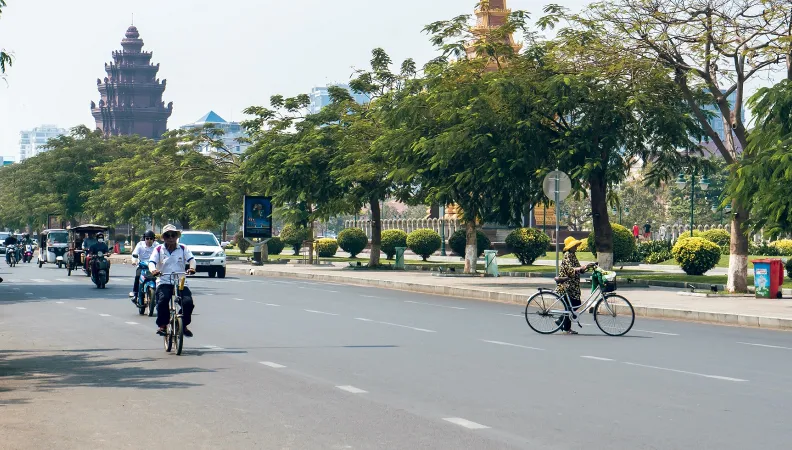 Cambodia is one of the 60 countries followed by AFD’s country-risk economists, whose assessments shed light on countries' economic trajectory and macroeconomic and financial situation.
Cambodia is one of the 60 countries followed by AFD’s country-risk economists, whose assessments shed light on countries' economic trajectory and macroeconomic and financial situation.
Context
AFD has been present in Cambodia since 1993 and supports the country by focusing on two key structural areas: promoting balanced territorial development (access to basic services, water resource management, adaptation to climate change, etc.) on the one hand and supporting the productive sector while respecting environmental and social standards (renewable energies, technical and professional training) on the other.
Goal
Produced by AFD's team of country-risk economists, macroeconomic country assessments provide an analysis of development processes in countries in which AFD operates. They also characterize their growth trajectory, and detect economic, social, political and financial vulnerabilities associated with these trajectories. AFD Group is thus in a position to properly measure the challenges and monitor the risks associated with each of its investments.
Emphasis is placed on developing countries, particularly in Africa, for which macroeconomic analyses are rare or infrequent. AFD seeks to complement existing production on the global economic situation, more focused on advanced economies and major emerging countries.
Find out more: Macroeconomic Analyses at AFD
Method
Country-risk analysis is based on a close follow-up over a long period of time and rooted in a fine knowledge of local contexts. Cyclical trends, often highlighted in the news, are always examined in the light of structural trends and of the regional context in which they take place. The aim is to highlight country-specific macroeconomic issues while assessing risks against comparable time- and space-based trajectories.
Country-risk economists place the study of socio-political vulnerabilities, the growth model, the viability of public debt, external balances and the soundness of the financial system at the heart of their assessment, and give specific attention to countries' exposure to climate risks.
Lessons learned
For two decades, Cambodia has been experiencing a gradual transformation enabling it to achieve significant economic and social progress and become a lower-middle-income country (LMIC). However, the various exogenous shocks since 2020 have underscored the fragile nature of the progress achieved and highlighted the challenges the country still needs to address to improve its socioeconomic environment, accelerate its economic growth and make it more inclusive, so that it can definitively leave the category of least developed countries.
Our publications on Cambodia's macroeconomic situation:
- "Cambodia: Significant progress towards sustainable economic growth", in MacroDev Semestrial Panorama n°44, July 2023
Contact:
- Laura Marie, country-risk economist at AFD
 The integration of young people into the labour market is a challenge for Côte d'Ivoire, in a context of strong population growth. AFD is working with the Centre de recherche microéconomique du développement (CREMIDE) of Université Felix Houphouët-Boigny in Abidjan to conduct a skills assessment in four secondary cities in the country, and examine their adequacy with local job offers. The objective is to formulate recommendations regarding the integration of young people into the labour market and increase the attractiveness of these cities.
The integration of young people into the labour market is a challenge for Côte d'Ivoire, in a context of strong population growth. AFD is working with the Centre de recherche microéconomique du développement (CREMIDE) of Université Felix Houphouët-Boigny in Abidjan to conduct a skills assessment in four secondary cities in the country, and examine their adequacy with local job offers. The objective is to formulate recommendations regarding the integration of young people into the labour market and increase the attractiveness of these cities.
Context
The economic upturn in Côte d'Ivoire since the 2010s has had a limited impact on employment. The transition to employment is often difficult: 35% of 16-35 year olds are far from the labour market (neither employees, nor educated or in training). Moreover, the share of informal employment remains very high (89.4% in 2019). In this context, as a result of population growth, 300,000 young graduates join the job market every year – and an equivalent number leave the education system without a diploma, and without prospects. The mismatch between skills and job offers would be one of the explanations for the difficulties of integrating young people into the labour market.
If these young people carry economic and social development opportunities, they also carry risks if their potential is not used. Population growth makes it imperative to understand changes in labour supply and demand in order to adapt the education and learning system to the needs of the local labour market.
Goal
This research project aims to analyze the supply and demand of skills in Bouaké, Daloa, San-Pedro and Korhogo, four secondary cities in Côte d'Ivoire with strong economic potential but that is still little exploited. The city of Abidjan, on which the majority of studies on Côte d'Ivoire focus, is not specifically addressed by this research, but it remains the "reference" case for the analysis of the situations of secondary cities.
Deepening the results of a previous research project on the mismatch between skills and jobs in Côte d'Ivoire, this research project aims to enrich national knowledge on the functioning of the labour market and the nature of bottlenecks that make the transition to employment difficult for young people, as well as to make recommendations aimed at promoting employment and the attractiveness of the four cities.
Additionally, the project includes capacity-building activities specifically targeting young CREMIDE researchers, to support them in the development of their research and to encourage the establishment of scientific partnerships through their participation in international conferences, workshops and training seminars, and through residence in specialized research centres.
Method
The study will include an in-depth examination of the structure and composition (demography, training and skills) of the local workforce, and of spatial inequalities in skills supply and demand. A gender-specific assessment of the local skills supply will also be carried out, as well as a prospective analysis of the impact of technological developments on the labour market in these cities.
The data used will come from both employment surveys available since 1993 and field surveys conducted during this project. The analysis will incorporate a prospective aspect aimed at understanding jobs in Côte d'Ivoire by 2025 and 2030.
Knowledge will be shared with the research community and made available to national and local decision-makers through workshops, conferences and publications in adapted formats to inform public decision-making.
Contact:
- Linda Zanfini, research officer at AFD
